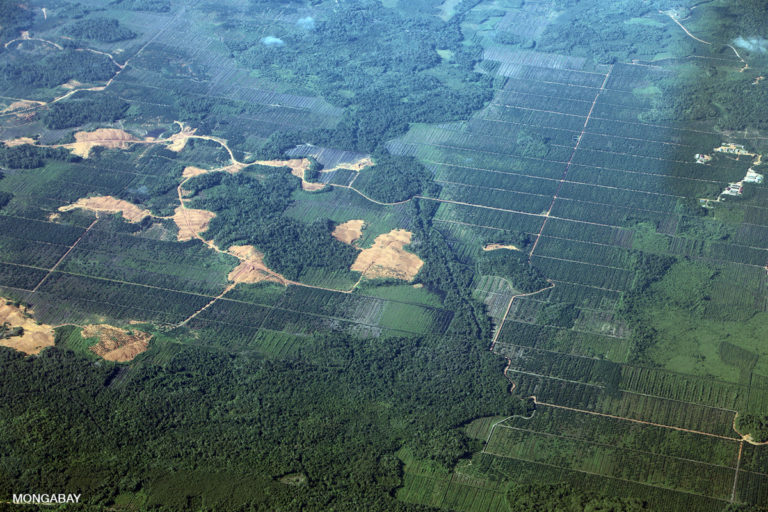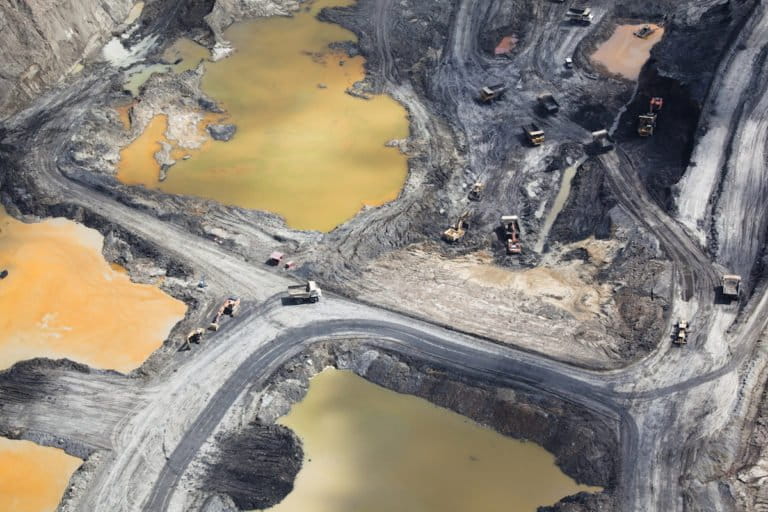- Indonesian President Joko Widodo has kicked off his second and final term in office with a pledge to boost investment and economic growth, largely through deregulation.
- Environmental activists say they fear this focus on investment at all costs will strip away the already scant environmental protections in the country.
- They say that, if anything, the government must strengthen regulations protecting the environment and vulnerable groups.
- Doing so will ultimately also benefit the economy, they argue, by ensuring that the country attracts high-quality investments.
JAKARTA — Environmental activists in Indonesia have called on President Joko Widodo to use his second-five-year term to strengthen protections of the country’s rich natural resources, after he failed to mention the environment in his inauguration speech this week.
Widodo was sworn in for his second and final term on Oct. 20, and used the occasion to emphasize ramping up his earlier program of developing infrastructure across the country. He also vowed to “simplify all forms of regulatory constraints” and revise laws that hamper job creation in the country. He promised a “large-scale simplification of the bureaucracy” to spur investments for job creation, and said Indonesia would reduce its dependence on natural resources to power the economy.
Jokowi, as the president is popularly known, previously pledged to revise at least 74 laws considered to be hampering investment in Southeast Asia’s largest economy, which has seen sluggish growth during his presidency.

Environmental defenders have criticized what they deem a narrow focus on investment and economic development, saying they fear it could mean scaling back of regulations meant to protect the environment and vulnerable groups for the sake of making it easier for companies to do business.
“Investment in the land sector remains very attractive,” said Arie Rompas, a forest campaigner at Greenpeace Indonesia, adding that some of the laws considered a hindrance to investment in this sector included those pertaining to the environment.
A series of massive protests broke out in September following the passage of a revised anti-corruption law that many say would weaken the country’s anti-graft agency, the KPK. The protests, led largely by university students, also demanded that parliament end deliberations on the passage of bills that many say would undermine democracy, individual freedoms, and environmental protection in Indonesia, such as draft laws on the penal code, mining, and land.
The protests succeeded in halting the passage of those bills, but the new batch of legislators sworn in earlier this month may resume the deliberations at any time; nearly half of them are affiliated with more than 1,000 businesses, including palm oil and mining, according to an analysis by the investigative magazine Tempo.
“The next government seems set to expand deforestation and increase forest fires on peatland,” Rompas said at a discussion in Jakarta on Oct. 17.
He was referring to massive fires that broke out in 2015 and again this year, most of them set in order to clear land for plantations, primarily oil palms. In the wake of the 2015 fires, Widodo rolled out a series of regulations, including a moratorium on peatland clearing, to prevent a recurrence. However, the disaster has flared up again this year, razing at least 328,000 hectares (810,500 acres) of land and generating clouds of haze that have sickened hundreds of thousands of people. Several of the companies whose concessions have been burning this year were also at the heart of the 2015 fires.

The fact that there’s been a recurrence of fires despite the regulations rolled out after 2015 indicate that environmental and social protections must be strengthened, environmental activists say.
“There’s no benefit in pushing for investment if the social and environmental impacts aren’t reduced — the push must go in line with tightening up environmental standards, so there won’t be any social and ecological conflicts,” said Henri Subagiyo, executive director of the Indonesian Center for Environmental Law.
“Deregulation is fair, but that doesn’t mean sacrificing environmental standards and social protection,” Henri added.
Instead of curbing environmental regulations, the government must establish more stringent standards as a way to attract more investment in the country, activists say.
“We’re worried that when environmental standards are reduced, transparency and accountability will decrease as well, and that would open up Indonesia to a flow of dirty money,” said Ariyanto, advocacy and networking manager at Publish What You Pay Indonesia.
Environmentalists are also closely watching Widodo’s cabinet picks for any ministers affiliated with political parties and/or businesses. The NGO Mining Advocacy Network (Jatam) reported earlier this year that Widodo’s presidential campaign was heavily funded by donations linked to the mining and palm oil industries, while his top campaign officials also have business holdings in these sectors.
Merah Johansyah, the executive director of Jatam, said there was a risk the new Widodo administration would drag Indonesia back into authoritarian territory, “backed by black [dirty] investment and funded by the oligarchs of the mining and extractive industries.”
“Our message to the president is that the economy won’t grow on a damaged planet,” Merah said, adding that Widodo’s policies over the next five years must reflect the country’s efforts to reduce its greenhouse gas emissions.
Indonesia, one of the world’s biggest emitters, has vowed to cut its emissions by 29 percent by 2030, or 41 percent with international assistance. Most of its emissions come from land use changes, including deforestation and forest fires.
“We call on the president to make environmental protection the backbone for his policies,” Merah said.

FEEDBACK: Use this form to send a message to the author of this post. If you want to post a public comment, you can do that at the bottom of the page.







